The Well Gardened Mind: Rediscovering Nature in the Modern World
£8.70£9.50 (-8%)
‘The wisest book I’ve read for many years … Much more than a gardening book, much more than a guide to mental health … Hugely recommended’ Stephen Fry
THE SUNDAY TIMES BESTSELLER
A Times and Sunday Times Best Book of 2020
How can gardening relieve stress and help us look after our mental health? What lies behind the restorative power of the natural world?
In a powerful combination of contemporary neuroscience, psychoanalysis and brilliant storytelling, The Well Gardened Mind investigates the magic that many gardeners have known for years – working with nature can radically transform our health, wellbeing and confidence.
With illuminating stories of how people struggling with stress, depression, trauma and addiction can change their lives, this inspiring and wise book of science, insight and anecdote – now translated into fifteen languages – shows how our understanding of nature and its restorative powers is only just beginning to flower.
Read more
Additional information
| Publisher | 1st edition (29 April 2021), William Collins |
|---|---|
| Language | English |
| Paperback | 352 pages |
| ISBN-10 | 000810073X |
| ISBN-13 | 978-0008100735 |
| Dimensions | 12.9 x 2.3 x 19.8 cm |

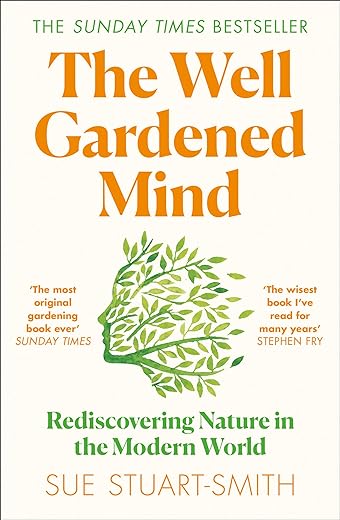
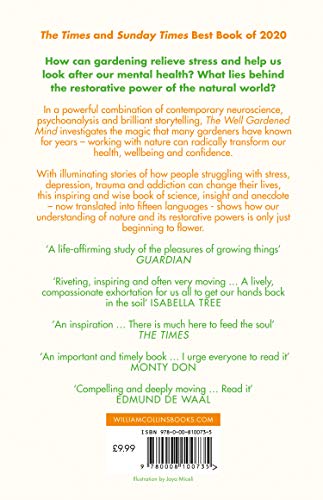

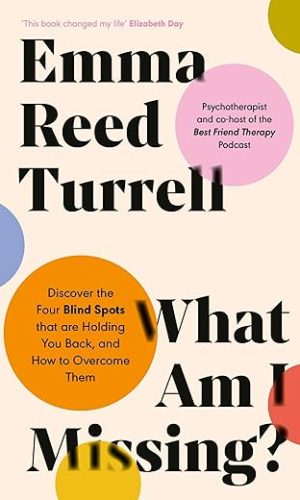
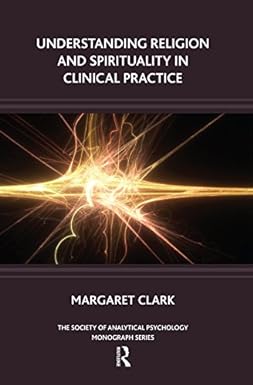
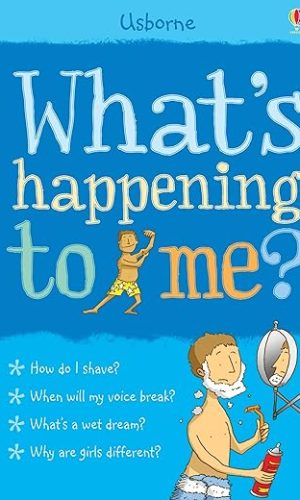
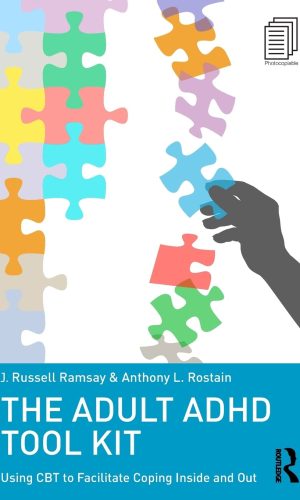
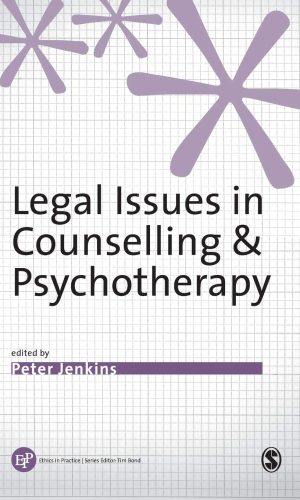
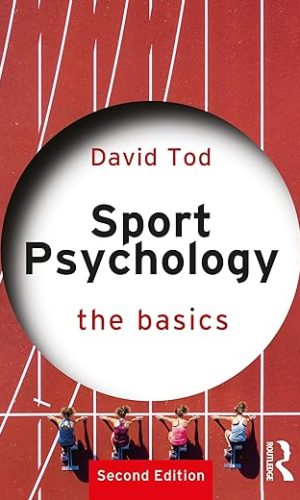
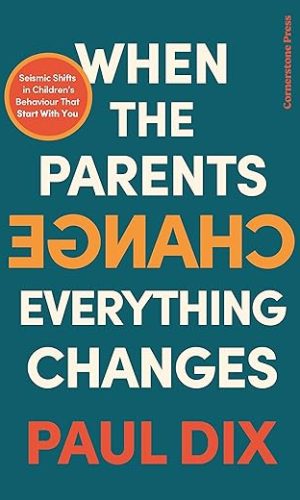
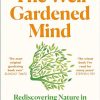
by Ali
Within this book I found what I look for when I read, emotional resonance with an author who can put into words, thoughts and feelings that I have but am too inarticulate to think of myself.
I most resonated with the poetic way Sue Stuart-Smith spoke of her personal feelings about gardening. The time stopping, delphinium moment was really touching and memorable for me. I loved reading about Sigmund Freud and the other psychology greats. I also enjoyed the wise words about the natural cycles of life and death and the interesting chapter on the gardeners in the First World War trenches. There are many heart-warming reminders of ways that horticulture and nature can bring healing and joy to just about anyone. I’m keeping my copy next to my bed in case I need a dose of joy at the end of a difficult day.
by William Jordan
If anyone ever thought any form of gardening was a good idea, you will read about it in this book. That is whether we are talking about modern scientific research, the ‘greats’ of psychoanalysis of the past, those trying to regenerate communities, work with offenders in institutions, or those with mental health issues, or improving end of life care – or indeed the views you’ll find expressed in ancient myths. There is also some family history here; and the personal experience of the author of gardening. The first set of photos in the book start with family photos and them move on to photos of Sigmund Freud in London and Donald Winnicott and then prisoners gardening at San Quentin jail. The second set of photos starts with garden in the trenches of the first world war.
This is a far-reaching exploration of gardening and the mind; and I enjoyed read it. But I sometimes wondered if something a little more focussed might have suited me better…
by westcountrywoman
Well argued thesis that gardening can aid people’s mental wellbeing, which we all kind of know already i guess, but this gives the scientific evidence to back it up. I found it a tiny bit repetitious in the middle of the book, where the author cites a lot of studies which all basically come to the same conclusion. It’s only a small point though because the author’s love of the natural world shines through every page, and it is a really lovely read. I learned some interesting facts I had never previously known – for instance, apparently gardeners’ hands absorb micro-organisims from the soil which have a beneficial effect on the brain – who knew?!! And the gardeners of Todmorden – I loved learning about them too and have thought about what they achieved for their community long after finishing the book.
by Jos Perris
A beautifully written book about the holistic healing qualities of gardening and nature. The book invites us to reflect on the life changing impact of sowing and nurturing a seed, based on the author’s fascinating research among prisoners, hospital patients and people with long term mental health challenges. The author explores the significant psychological and physiological benefits of sowing, watering, weeding or simply spending time in a garden. As she says in the book: ‘When we work with nature outside of us, we work with nature inside of us.’ The book helps us to reconnect with our inner self; the real person that we were intended to be. We are also encouraged to reflect upon the importance of just simply ‘being’ rather than always ‘doing’. We are reminded that the gardener plays an important enabling role with the seed; but it is in this interaction with nature, that enables both the seed and human to flourish. I really loved it and highly recommend as essential reading to all.
by Gary Bradshaw
This is literally the most interesting book I have read in years. As someone who sees gardening and gardens as wholesome and therapeutic and even life saving, the book is a gift. It has highlighted so many different angles and perspectives on gardening .( Soldiers building gardens in their trenches during the First World War ?) Sue Stuart-Smith , has the knowledge and experience to look at gardens from their historical, psychological, medical, political/sociological, and religious perspective and does so in a style which is enjoyable and with warmth and enthusiasm. It is well referenced and gives plenty of scope for the reader to explore the subject further in their own time . I just wish more people would understand that gardening is so much more than a neat lawn and pretty borders. Thank You Sue Stuart-Smith for this treasure.
by Ellie Muffitt
This book is really fantastic, I enjoyed every chapter! I bought it because I was interested in how gardening can affect our mental health, but I found every part of the book really interesting (which I think can be quite rare). I don’t usually leave reviews but I liked this so much I thought I would.
Stuart-Smith talks about people’s connection to gardening, and how caring for plants helps us – whether that’s how it helped people who gardened thousands of years ago, to how it has helped people recovering from trauma after WW1, to how it helps people living in built-up cities now. It had lots of research in but didn’t come across as too academic, which I liked. Running through all of this are anecdotes about how gardening has helped/soothed her and her family members over the years, plus interviews with other people about the projects they work on to bring gardening to people. A really great book, I can’t recommend enough.
by Mrs. R. Dickson
This is a well written, well researched wonderful book about why gardens and growing things is so good for our psychological health and how we are unarguably connected to nature as beings. At times it is almost poetic in its prose. Sue shares the importance of her grandfathers recovery from war trauma through growing and how this inspired her and how gardening helped her own recovery during a period of ill health. Being a Psychotherapist there is plenty of evidence as to how gardening works for us on a deeper neurological and emotional level and how it works for mental health from anxiety to grief, trauma and how it offers transformation and above all hope. I can highly recommend. I loved it.